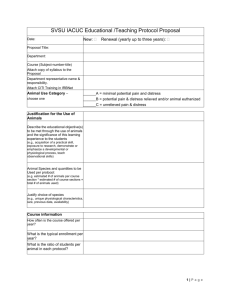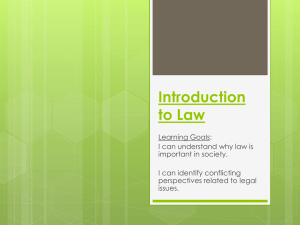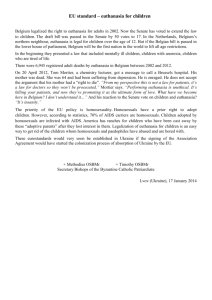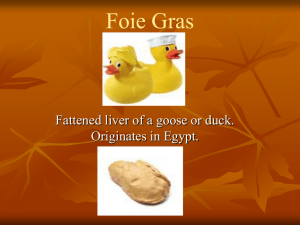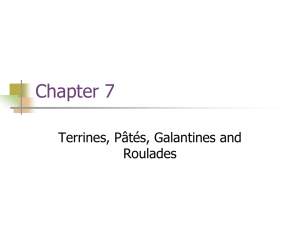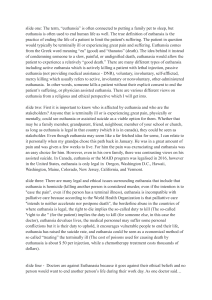Protecting animal rights regarding scientific testing
advertisement
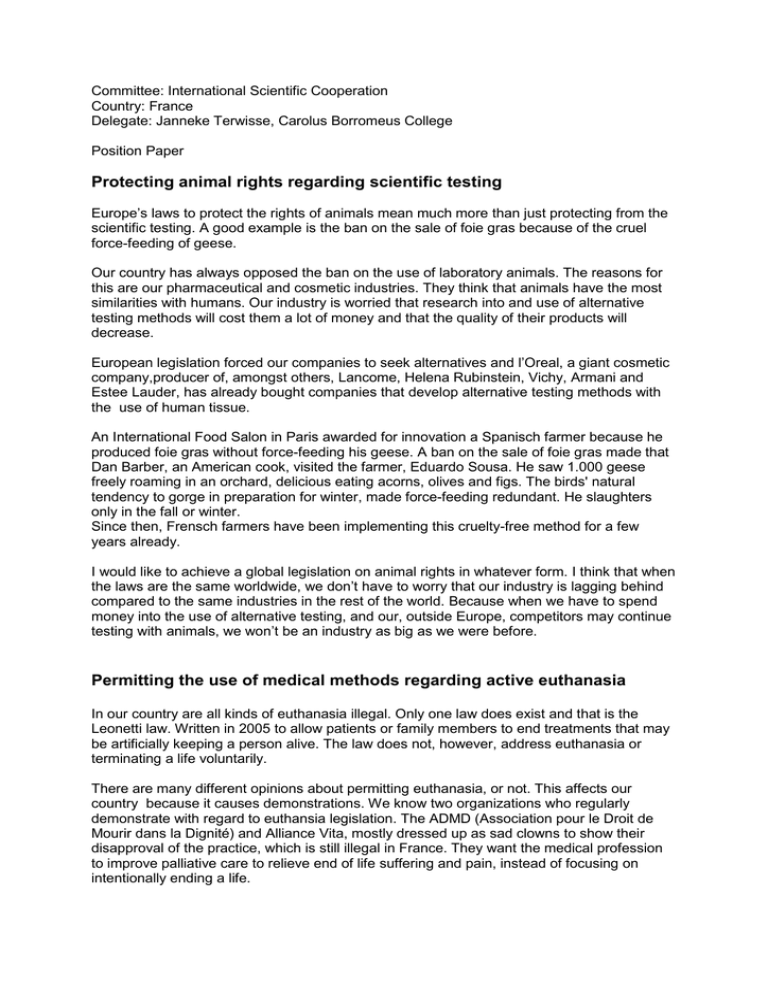
Committee: International Scientific Cooperation Country: France Delegate: Janneke Terwisse, Carolus Borromeus College Position Paper Protecting animal rights regarding scientific testing Europe’s laws to protect the rights of animals mean much more than just protecting from the scientific testing. A good example is the ban on the sale of foie gras because of the cruel force-feeding of geese. Our country has always opposed the ban on the use of laboratory animals. The reasons for this are our pharmaceutical and cosmetic industries. They think that animals have the most similarities with humans. Our industry is worried that research into and use of alternative testing methods will cost them a lot of money and that the quality of their products will decrease. European legislation forced our companies to seek alternatives and l’Oreal, a giant cosmetic company,producer of, amongst others, Lancome, Helena Rubinstein, Vichy, Armani and Estee Lauder, has already bought companies that develop alternative testing methods with the use of human tissue. An International Food Salon in Paris awarded for innovation a Spanisch farmer because he produced foie gras without force-feeding his geese. A ban on the sale of foie gras made that Dan Barber, an American cook, visited the farmer, Eduardo Sousa. He saw 1.000 geese freely roaming in an orchard, delicious eating acorns, olives and figs. The birds' natural tendency to gorge in preparation for winter, made force-feeding redundant. He slaughters only in the fall or winter. Since then, Frensch farmers have been implementing this cruelty-free method for a few years already. I would like to achieve a global legislation on animal rights in whatever form. I think that when the laws are the same worldwide, we don’t have to worry that our industry is lagging behind compared to the same industries in the rest of the world. Because when we have to spend money into the use of alternative testing, and our, outside Europe, competitors may continue testing with animals, we won’t be an industry as big as we were before. Permitting the use of medical methods regarding active euthanasia In our country are all kinds of euthanasia illegal. Only one law does exist and that is the Leonetti law. Written in 2005 to allow patients or family members to end treatments that may be artificially keeping a person alive. The law does not, however, address euthanasia or terminating a life voluntarily. There are many different opinions about permitting euthanasia, or not. This affects our country because it causes demonstrations. We know two organizations who regularly demonstrate with regard to euthansia legislation. The ADMD (Association pour le Droit de Mourir dans la Dignité) and Alliance Vita, mostly dressed up as sad clowns to show their disapproval of the practice, which is still illegal in France. They want the medical profession to improve palliative care to relieve end of life suffering and pain, instead of focusing on intentionally ending a life. Even in election time, changing the euthanasia law, was a subject where the opinions differed. Mr. Sarkozy didn’t want to change the law and Mr. Hollande promised to look into it. But eventually,when he was president, he didn’t. What I want to achieve is that everyone in our country and in the rest of the world, has the right to perform euthanasia under strict conditions. In case of incurable disease, unbearable pain or a degrading dignity. And only of course when the person concerned, wants to end his/her life. Patenting of life-saving medical treatments Medications consist of several components, all patented by various companies. Because of these patents the prices of the components are very high and so becomes the sellingprice of the drug exceptionally high. In our country, we must, like the rest of Europe, comply with Article 52 (1) XIII of the European Patent Convention which states that patents shall be granted for any inventions which are susceptible of industrial application, which are new. Our pharmaceutical industry is market leader in Europe for the production of medicines. This position is under pressure because a large number of patents expire. As a result, more and more partnerships, to reduce the cost of product developments to share. Also appeared recently a report stating that half of the medication in France is useless, 20 percent is not tolerated and 5 percent even dangerous. To tackle the huge deficits in healthcare it is enough to take all the dangerous, ineffective and useless pills off the market. Due to expiring patents, increasing deficits in healthcare and the availability of cheaper alternatives our pharmaceutical industry has to look for partnerships. Unitaid is an alliance of France, Brazil and England. This alliance is planning to produce cheap drugs for the poor developing countries where millions of children are suffering from aids. On this subject, I hope to achieve broad cooperation between the world’s leading pharmaceutical companies. A collaboration that makes life-saving medicines affordable for everyone.
